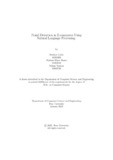Fraud detection in E-commerce using natural language processing
Abstract
Electronic commerce sometimes referred to as e-commerce is a type of business
that enables both businesses and private individuals to purchase and sell products
and services online. E-commerce in Bangladesh is thriving from the last decade,
especially during the coronavirus pandemic with the growth of online sales. Digital
commerce is currently struggling to regain trust after allegations of annexation and
fraud surfaced against a few firms in recent months. Over 11.48% clients of the
internet business area were beguiled last year from di↵erent web based business
and Facebook trade (business) sites. Fake reviews are one of the most prominent
fraudulent activities in this field. When we try to buy anything online or book
any hotel from an app or a ride from any ride sharing app we heavily rely on the
reviews of past customers.It makes the decision making process easier. This is why,
with the ongoing development of e-commerce platforms online reviews are seen as
essential to upholding a company’s reputation. Generally a positive feedback from
a customer gathers the attraction of many searching for the same product. For this
reason, many e-commerce sites are generating fake reviews to attract more customers
towards them. Detecting fake reviews is an ongoing research area. As all the reviews
are not trustworthy and honest, it is crucial for us to develop techniques for detecting
fake reviews. We are proposing a machine learning approach to generate and detect
fake reviews.We used Natural Language Processing(NLP) to extract meaningful
features from a text for detecting fraud reviews. Therefore, in this study, we present
a comprehensive and e↵ective framework that enhances the e

